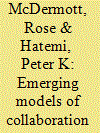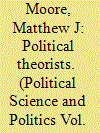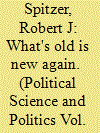|
|
|
Sort Order |
|
|
|
Items / Page
|
|
|
|
|
|
|
| Srl | Item |
| 1 |
ID:
096201


|
|
|
|
|
| Publication |
2010.
|
| Summary/Abstract |
In increasing numbers, political scientists are engaging in collaborative research. It is useful to consider the advantages of such efforts and to suggest strategies for finding optimal collaborators. In addition, there are issues and challenges that arise in the face of increased collaboration, particularly interdisciplinary collaboration across the life and social sciences. Inevitably, as the discipline has moved from a dominant solo-author model to a wider array of authorship possibilities, whether those teams encompass two-person partnerships, large research teams, or something in between, new administrative and cultural questions have already begun to surface as the discipline works to assimilate these changes. Consonant with previous efforts by the American Political Science Association (Biggs 2008; Chandra et al. 2006), we seek here to continue a broader disciplinary conversation surrounding the opportunities and challenges posed by more diverse patterns of teamwork. In so doing, we hope to help continue to encourage transparent, predictable, and openly collaborative intellectual partnerships wherein individuals receive the institutional credit and merit they deserve.
|
|
|
|
|
|
|
|
|
|
|
|
|
|
|
|
| 2 |
ID:
181075


|
|
|
|
|
| Summary/Abstract |
In 2017, the American Political Science Association (APSA) Committee on the Status of Graduate Students in the Profession launched an initiative to lower the cost of Division (i.e., organized section) membership for students to promote graduate students’ professional development and to advance Division interests. This article assesses the effect of this intervention on Division membership. Using APSA membership data, we find that almost two thirds of Divisions that charged fees in 2017 reduced or eliminated student fees between 2017 and 2019, nearly halving the average student dues (i.e., from $11.57 in 2017 to $5.84 in 2019). As a result, average student membership increased by more than 300% in Divisions that reduced fees (i.e., from 79.5 in 2017 to 248.7 in 2019), compared to a marginal 30% increase in those that did not reduce fees. These outcomes of the initiative support additional efforts to reduce the costs of APSA participation for graduate students.
|
|
|
|
|
|
|
|
|
|
|
|
|
|
|
|
| 3 |
ID:
096380


|
|
|
|
|
| Publication |
2010.
|
| Summary/Abstract |
The question of the role of normative or historical political theory within the broader discipline of political science has been controversial at least since the founding of the American Political Science Association (see Gunnell 2006 for a brief overview). Perhaps it goes without saying that during that same period people who think of themselves as engaged in political theory have disagreed among themselves about the core concerns of the field, the appropriate kinds of graduate training, the relative value of various authors and texts, and, of course, about theory's role within political science.
|
|
|
|
|
|
|
|
|
|
|
|
|
|
|
|
| 4 |
ID:
126330


|
|
|
|
|
| Publication |
2013.
|
| Summary/Abstract |
Political science and law intersect not only in the political world, but as disciplines. This is as it should be, and for two important reasons: disciplinary history and content. As Fisher (2009, 798) notes, the first political science graduate program, founded in 1880, studied "history, law, and philosophy." The American Political Science Association, founded in 1903, defined itself in terms of six distinct areas of study, five of which-comparative legislation, international law, constitutional law, administrative law, and jurisprudence-were in some manner about law (798). In addition, law is the expression of authority by the state. Its formation, content, and consequences form the purest expression of governmental power through what we more comprehensively define today as public policy. Early in the history of our discipline, political scientists approached the law in a manner that was "legalistic, formalistic, conceptually barren and largely devoid of what would today be called empirical data" (Somit and Tannenhaus 1967, 69). That is, they approached it as did lawyers of the time. Yet as political science matured, those who studied public law ceased being merely "little lawyers," vesting their work with no less respect for the content of law, but tempered also with the tools and perspectives of what was by now a distinct discipline. No early political scientist better exemplified this maturation than Edward Corwin, especially (although not exclusively) as reflected in his timeless study, The President: Office and Powers (1957).
|
|
|
|
|
|
|
|
|
|
|
|
|
|
|
|
|
|
|
|
|